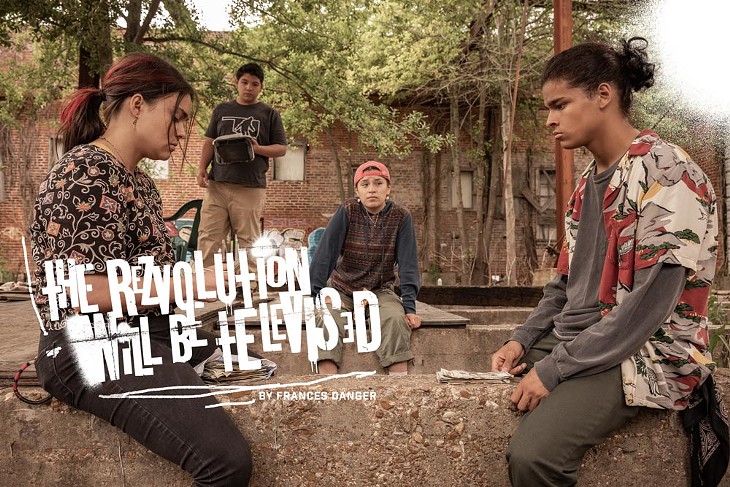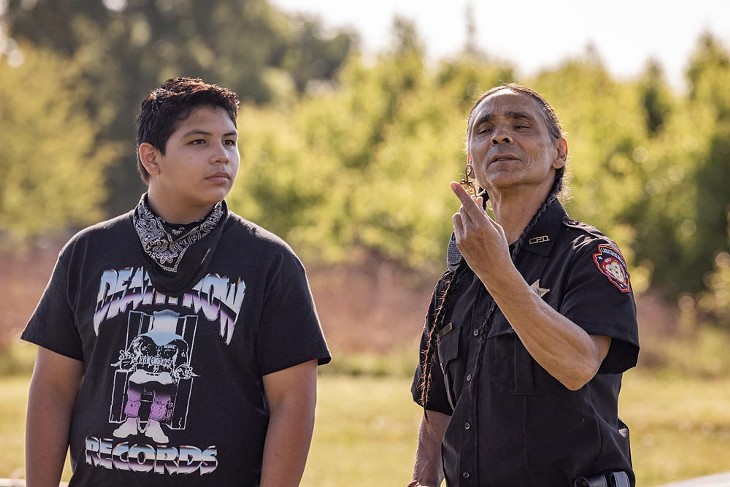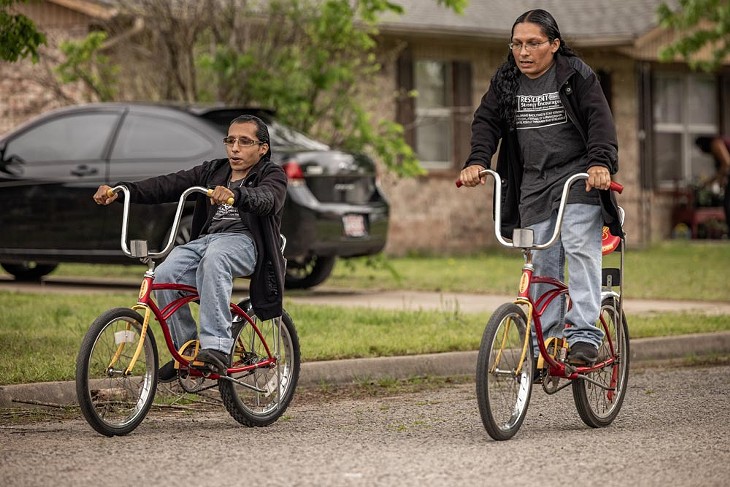
In the historic tribal sovereignty ruling of McGirt v. Oklahoma, the U.S. Supreme Court declared almost
half of Oklahoma to be Indian Country. With a 100% “Certified Fresh” rating on Rotten Tomatoes and the rise in popular parlance of “Sonics,” Sterlin Harjo (Seminole/ Muscogee) and Taika Waititi (Maori), as co-creaters and executive producers, proved the rest of the United States is Indian Country too.
The comedy follows four teens: Bear, Elora Danan, Willie Jack, and Cheese. Chronicling their lives on the Mvskoke Reservation in Oklahoma they so desperately want to leave, the series was renewed for a second season before the first concluded this month. Historic in its unprecedented use of Native talent, it boasts an all Indigenous main cast, writers room, and slate of directors, as well as a mostly Indigenous production team. What has previously not been a selling point, Indigenous representation, is what makes the show a must-see.
Elva Guerra (Ponca, Indigenous Mexican), who plays Jackie, leader of the NDN Mafia, says they are “honored to be one of the many faces to represent our people.”
“As a young Indigenous person, it helped me reclaim my Native roots and turn it into something I was proud of instead of embarrassed. That’s what good representation can do.”
Sierra Revis, a production assistant and graphic designer who conceived the medallions in episode four that Bear hoped to gift to his father, has seen the impact of the show firsthand.
“I’m very thankful for Sterlin and Taika for giving this opportunity for a lot of us. When I talk to other people, whether they’re Native or not, that are still around Tulsa that were on the show, some of them really talk like this
changed their lives in a lot of ways and I was like, ‘Wow.’ I mean I guess it’s changing my life too,” Revis said.
Mike Bone, which is the name brothers Lil Mike and Funny Bone (Pawnee) perform under, the Native proto-Greek Chorus that move the story along as well as give the Rez Dogs their name, can already see changes in the way people perceive Natives.
Lil Mike sees this especially in the overwhelming response to the show. “... People are latching onto this because they’re like, ‘Interesting. I’ve never known this about Native Americans.’”
“Just to humanize us, too. I think that helps to show people we aren’t all living in tipis and stuff, and we’re actually dealing with the same problems a lot of Americans are facing,” Funny Bone said.
The environment the show was produced in, one informed by Native voices, created a supportive space that translated to the screen.
“Every day on set was like going to a family reunion. It was comforting to have people who look and act like me surround me. It was easier to be myself,” Guerra said of the shoot. “The people, environment, and wonderful Indigenous feedback made my character that much more authentic. It also just seemed like people wanted to be on set instead of it being a negative obligation.”
Rivas agrees. “This is the first job that I really woke up every day and I was like, ‘All right I’m going to do my very best today.’”
“We’ve been in a couple of underground movies or whatever and it’s never been much Native representation, so it really felt like home. Whenever we showed up on set I didn’t feel like I was just standing off in a corner not mingling. Because sometimes you get into
a crowd where you feel like you don’t fit in and you just kind of stand off to the side and we didn’t have to,” said Funny Bone, describing the production’s atmosphere.
What Is Native RepRezentation?
One of the many viral moments Reservation Dogs gifted us with (and there were many) is the indelible image of Native rapper Punkin Lusty extolling the virtues of Native women and that most Native of foods, greasy frybread (greasy greasy frybread).
In the fourth episode, “What About Your Dad?,” we’re introduced to lead character Bear’s father, the aforementioned Punkin Lusty. Lusty, portrayed in the series by hip hop artist and first-time actor StenJoddi (Muscogee), is all swagger and braids, grillz and chains. He’s booked to play a show on The Rez at the Indian Health Service anti-diabetes rally. After hyping up his son about his visit, and despite his mother’s (Sarah Podemski, Anishinaabe/ Ashkenazi) attempts to mitigate it, Lusty, an absent father, a ghost in the mind of Bear who hopes against hope that for the first time he’ll be real, ultimately disappoints yet again, with a lie and a last-minute cancellation of the show.
But it wasn’t just Bear that was let down by Punkin Lusty.
Despite its near universal acclaim, Reservation Dogs is not without detractors. With a TV show billed as being the first of its kind in Native representation, it’s the lack of representation with which some take issue.
Alexis, D’Pharaoh Woon-A-Tai | Photo Shane Brown/FX
Though in the first episode the main characters steal a delivery truck from a Black man, there is little to no Black or Afro-Indigenous representation otherwise.
The concerns about Reservation Dogs and accusations of anti-Blackness reached a boiling point with episode four but they started well before then.
“That was in the first couple of episodes and then I started to see comments about anti-Blackness in the show,” Ean McCants, Chickasaw and Choctaw Freedmen, said.
“One thing I did comment on and notice was the lack of Black people on the show. I have a lot of Creek Freedmen relatives who live in the Creek Nation. Okmulgee has a large Black population that’s about equal to the number of tribal citizens in Okmulgee so I was disappointed but not surprised to not see any real representation of Black Natives or Black people in the show,” McCants said.
“Okmulgee is 20 minutes away from Grayson, which is an all-Black town, and Black Creek people have been a part of the Nation since before Removal, so in that way I thought the portrayal of the Creek Nation was inaccurate,” he said.
One scene in particular bothered him. “...There were moments where Black culture or history was slightly present with no Black people and it was insulting to me. The scene where Bear’s mom had a one-night stand with the white dude with the Confederate flag tattoo and then there were Creek people as his servants. Was very strange when slavery was a part of the Creek Nation... I thought it was disrespectful how that was portrayed.”
The criticism reached a fever pitch when it was revealed that StenJoddi had a documented history of the use of a slur about Black people on social media several years ago, leading him to become a lightning rod for the frustrations of Black Indigenous and Afro-Indigenous viewers.
Screenshots show between the years of 2014 and 2017 StenJoddi used the N word at least four times on social media. These were not simply instances of playful greeting that one might try to easily dismiss and StenJoddi does not try to do so.
While two of the occurrences were intended to compare the use of the term “Redskins” as a team mascot name StenJoddi takes responsibility for those without equivocation.
On Sept. 17, StenJoddi addressed his past remarks with an apology via Twitter. It read, in part, “I would first like to truly & sincerely apologize to anyone who has seen them and was hurt by them. I realize I have offended and hurt people with my ignorant and racist comments. I’m not here to justify anything I said and I take full responsibility and accountability for my past, present, and future. It was a different time in my life and it was never my intentions to hurt or offend anyone. I have not used such language in many years but I will still be taking the steps to learn and grow as a human from this and to be a better human in the future as I have been doing in my life these past few years.”
In response, the show released this statement:
“We were recently made aware of past racist comments by Sten Joddi and we condemn those comments in the strongest possible terms. We are glad he has taken responsibility and apologized for his remarks, and we are encouraged that he is going to take the necessary steps to better educate himself.”
That evening, StenJoddi confirmed via tweet that he would not be returning to the show.
Oklahoma Gazette spoke with StenJoddi regarding the fallout.
“I’m going with this forward trying to understand the reasons why this anti-Blackness situation may have arose within my character, within my life even, and I’m still trying to educate myself with my peers and other people in the industry, be it Black Indigenous People of Color and even some of my own family and some really good friends. In my mind, it was OK at the time or I justified it by my environment, upbringing. I mean, I got brought up in Glenpool and I ran around Okmulgee and I ran around Sapulpa and I ran around Tulsa my whole life,” StenJoddi said.
“There’s a large Black community there and that’s what I was raised around. Again, no excuses and I should know better and I am sorry, but at the same time you know I can only be me and I can only be who I am now and be the person that I’m trying to become and that’s been a growth situation over the course of maybe 15 years. I’ve been growing into a better human. This is not a bad thing. I think it’s definitely an educational moment, a learning moment. I know that I need to continue to learn and educate myself as well as speak to the correct people to educate myself and I’m trying to get through that,” he said.
Beyond StenJoddi, it seems these accusations of anti-Blackness shadowing the show may be more substantive than most know. The Five Nations, more commonly known as the Five Civilized Tribes and composed of the Muscogee, Choctaw, Chickasaw, Cherokee, and Seminole, were historically slaveholders. Part of their “civilization” was adopting a more colonial way of life. This included the enslavement of Black people.
It was not just colonization that ensured continued enslavement. The Five Nations embraced the concept with varying degrees of fervor, so much so that enslaved Black people were forced to walk the Trail of Tears with the tribes, a move that saw 8,000- 10,000 in Indian Territory by 1861. When it came time for the Civil War, many Natives of these Nations fought for the Confederacy.
Conversely, part of modern Native identity that is not well known outside the community is the constant self-doubt as to whether you’re “Native enough.”
“I know the feeling of being excluded. But I also look Native so when I watch the show I’m like yeah. And I grew up in those communities. I was like yeah that’s me on TV, that’s great. But it’s also like well, I can’t imagine because in our communities we all have this identity crisis. No one’s ever Native enough. Even if you “look Native” you’re still not Native enough. And then I can’t imagine not looking the stereotypical Native look and then still not see yourself on TV. It’s uncovered a lot of issues in Native communities,” observes Rivas.
“Being the Indian Native rapper in the first place and you know not being Indian enough, not being White enough, and not being Black has always kind of been a, it’s kind of been a thing that I’ve just stood in the middle of my whole life. I’ve always done rap music ever since I was 13. It’s not something I just picked up for a show. I’ve always stood on that line of identity crisis, identity issues in being Indigenous and ain’t coming up with really no identity to relate to from music to TV,” echoes StenJoddi.
“We’re representing ourselves in the only way we know how I think, whether it be this continued colonized mindset of who we think we should be or who we think we even are and we’re still trying to tear down those though stereotypes and those walls.”
This loss of culture and identity are the exact issues that Reservation Dogs hopes to address with the depiction of Natives as modern human beings navigating a world in which they are so often stereotyped and erased. Their success is indicative of the need for this type of authentic representation of all Indigenous Peoples, the type that can only come when Natives are allowed to tell their own stories.
It was announced on Sept. 21 that the writers room for the second season had been expanded, adding Devery Jacobs (Elora Danan), Dallas Goldtooth (Spirit), Ryan Redcorn, and Chad Charlie, an Afro-Indigenous filmmaker, among others.
All episodes of Reservation Dogs, which streams on FX on Hulu, are now available for viewing. The show is slated to begin its second season in 2022.









